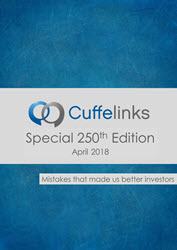 Special Edition 250 includes over 30 market experts sharing a mistake that made them better investors.
Special Edition 250 includes over 30 market experts sharing a mistake that made them better investors.
Since Edition 1 of Cuffelinks, we have focussed on independent expert insights from high-profile finance professionals to deliver useful ideas to our community, now over 35,000 strong.
It's an important time to learn these lessons, as the 88-year-old founder of Vanguard, Jack Bogle, recently said in a CNBC interview:
"I have never seen a market this volatile to this extent in my career. Now that's only 66 years, so I shouldn't make too much of it."
We had a fantastic response from people we approached, but something new happened this time. Disappointingly, some fund managers were prevented from offering a response by their legal and compliance team. It's a sad state of affairs when a fund manager is unable to admit a mistake, as we're all supposed to learn from them. The question we asked was:
"What is an enduring investment lesson you learned from making a mistake?"
We also had responses asking what a 'mistake' really is, such as:
"What is a mistake in investing? Too often managers admit to mistakes (that reveals their deep humility) that weren't mistakes; rather the market went against them. As in bridge, you can make excellent decisions with rotten outcomes and rotten decisions with excellent outcomes."
One famous local fund manager wrote that identifying a mistake can relieve stress:
"Insights from past failures can help boost performance on a new task – and this study is the first, as far as I know, to explain why. The researchers report that writing critically about past setbacks leads to lower levels of the 'stress' hormone, cortisol, and more careful choices when faced with a new stressful task, resulting in improved performance. The study, published in the journal Frontiers in Behavioral Neuroscience, is the first demonstration that writing and thinking deeply about a past failure improves the body's response to stress and enhances performance on a new task."
Another was more skeptical:
"The harsh truth is that I don’t believe any investor really learns from their mistakes in any meaningful way. By this I mean we can easily avoid investing in the same dud company, but that doesn’t stop us investing in other dud companies. We can then develop personal heuristics that steer us away from all companies that have similar traits to the dud one we lost money on, only to find out that some of them turn out to be great investments. The problem of course is that history never exactly repeats.
The reasons we make mistakes can usually find their roots in the human foibles we learn about in behavioural finance (anchoring, confirmation bias, recency bias, etc), and because we are human we keep making them. And the problem with the behavioural finance work is that it’s a very good descriptor of why we have stuffed up in the past, but offers little by way of prescription for future success. I reckon the biggest mistakes we are likely to make comes from over-confidence."
Investors learn from previous experiences, whether or not they are considered mistakes at the time, and sharing the lessons from market professionals may help our readers.
Graham Hand Managing Editor Cuffelinks